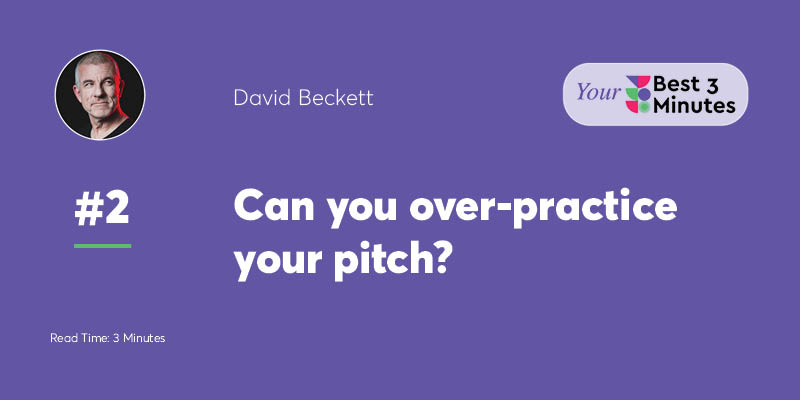
Prefer audio? Listen to David reading this post here – or listen to all posts on Spotify. ![]()
Subscribe to the Newsletter
Join 25,000+ entrepreneurs and professionals. Get exclusive tips and tools to help you raise money and get buy-in for your ideas.
Can you over-practice
your pitch?
Preparation matters: not many deny it. But can you over-practice?
My definitive answer to this often-raised question?
A loud, and clear… No!
Here’s what I’ve seen across 11 years of coaching close to 40,000 people to pitch, and over 30 TEDx speakers.
There are 2 categories of people;
#1. The 0.1% who don’t need any practice or preparation at all.
#2. The 99.9% who can’t over-practice – the more, the better.
It’s good to have an honest assessment of where you sit right now. Group #1 is very attractive – it gets you off the hook of a lot of work!
But most likely you’ll be in group #2, with the rest of us mortals.
Let’s look at each of these two groups – starting with the one filled with speakers who seem indestructible.
Group #1: The 0.1% who don’t need any practice
I regularly hear advice for startups such as; ‘Just go up and be yourself.’ ‘All you need to do is tell a story.’
And if you are Gary Vaynerchuk, Ali Abdaal, or Tony Robbins, this might just be true. These people speak for a living, and have millions hanging on every word.
On stage, they talk about what they talk about every day.
Give them 30 minutes and they will effortlessly take an audience on a journey, because it’s an integral part of their work.
You as an entrepreneur, solopreneur or busy professional have a ton of things to do, other than speaking. If you don’t present on video, online or on stage every day, it’s natural you can’t just wing it.
This group are also not pitching. If you gave them the challenge of a 3-minute pitch, probably they would struggle to have a good structure; get to the point; and finish within the time.
Preparation and practice is the key for the majority of people pitching.
Group #2. The 99.9% who can’t over-practice – the more, the better.
First: why do we even think about this concept of ‘over-practicing?’
The fear is : ‘If I practice too much, I will be inauthentic.’
My counter-argument to this is: if you don’t practice enough, you will be inauthentic!
You see: if you are unsure of your story, it’s really hard to deliver it in a way that is in line with what you truly feel and think. WIth a short pitch, it’s really hard to think on the spot.
Time pressure x public speaking pressure = brain does not work!
So we need simply to be able to deliver what we prepared. Practicing goes in 3 phases;
- Get the pitch memorised.
- Assess what you really want to say: which words matter
- Turn the memorised script into an emphasised story through repeating it out loud numerous times.
If you’re still wondering whether this really helps, think about the last concert you went to; the last theatre show or movie you saw; did the band or actors make up the words on the spot?
Or did they think carefully about what they wanted to say? Then practice like crazy to tell it in a way that communicated what they think and feel – and what they want you to think and feel?
Even very experienced speakers practice to the last second.
I coached at TEDx CERN a few years ago. During the run-throughs a day before the big event, singer/comedian Vikki Stone did a masterful test run.
The following day, I saw her practicing. Movements, gestures, vocals, everything.
I asked her later – why do you need to do this? The pre-show was brilliant! She answered:
“I just want to make sure I don’t have to think once I’m up there.
Practice feels like it builds muscle memory, and I want a solid basis so I can improvise if I need to.”
Every TEDx talk you have ever seen is scripted, memorised and practiced relentlessly. Actors with 30 years experience on stage, and presenters who speak in front of audiences every day – they all practice until the last minute.
I’ve been asked: ‘You’ve been on stage loads of times – do you still practice?’
Yes, very much so. When I pitched at ‘Present Your Startup’ in 2019, I did 36 run-throughs of my 3-minute pitch the day before.
It was a lot of work – but the memory of that work evaporated when I won!
Put the work in. It will pay you back 10X.
You don’t need to invest TEDx levels of time – but certainly more time than a person who speaks on stage for a living.
Allocating parts of your day in advance of an important pitch to practice your message will make all the difference.
There’s nothing quite like getting onstage, feeling certain of success, because of the time you invested in focused practice.
Good luck with the practicing your pitch – see you next week!
Subscribe to the Newsletter
Join 25,000+ entrepreneurs and professionals. Get exclusive tips and tools to help you raise money and get buy-in for your ideas.

